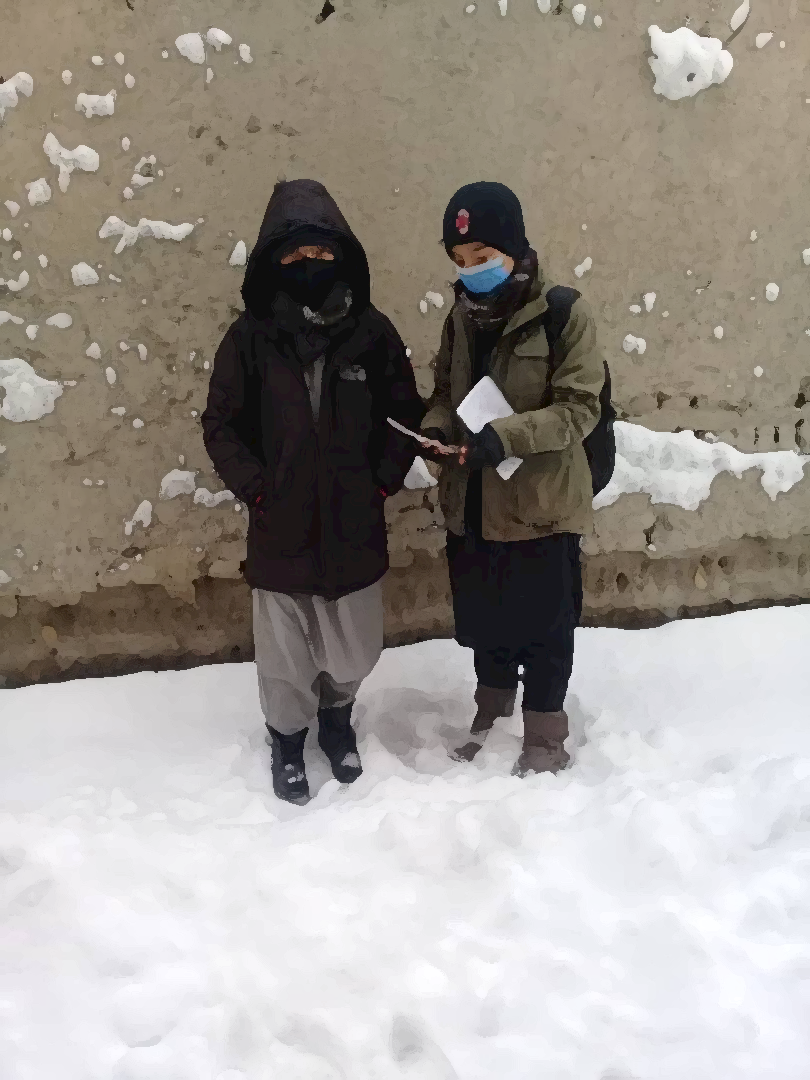Women’s History Month: Afghan Girls Struggle for Education, Part 3

To commemorate Women’s History Month, the Afghanistan Policy Lab at the Princeton School of Public and International Affairs has conducted interviews with eight courageous Afghan school-age girls in Afghansitan. (Read Part 1 and Part 2.) These courageous individuals have been prevented from attending secondary school since the Taliban seized power in 2021. Their stories shed light on the stark reality faced by girls who once enjoyed fundamental freedoms and rights, such as the ability to attend school, participate in recreational activities, socialize with friends outside of their homes, engage in sports, and freely walk outside of their homes without a mahram (male chaperone.) Following the Taliban's takeover, unfortunately they have been deprived of these fundamental liberties due to the imposition of Taliban’s harsh restrictions. Despite the challenges, these resilient girls refuse to surrender their dreams and aspirations, and each of their stories is a testament to their resilience and courage. Online tools to resist and fight back, as one of them bravely stated: “The Taliban have a strong fear of educated women because they know if a woman gets education, she won’t raise a Talib.” Empowering Afghan women through education stands as the antidote to the Taliban's oppressive regime.
This week APL is sharing with you the stories of Aisha, Marwa, and Zarina.
The interviews were conducted via WhatsApp messenger. To ensure the safety of the girls, pseudonyms have been used in the stories.
Aisha and Marwa's Story
“We pretended to be boys so we could attend classes”, Aisha and Marwa
When the Taliban seized control of the country, Aisha and her sister Marwa were tenth and ninth-grade students, respectively, both excelling in their studies. The day the Taliban announced their ban on girls' education beyond sixth grade, that night both sisters wept until the dawn. The denial of education left them both heartbroken and ill in bed. Their elder sister, who had completed her university education before the Taliban's return and was employed in a private media outlet, enrolled them in an English language learning center to uplift their spirits. Through language classes and engaging in handicrafts temporarily, their mental well-being gradually improved. However, their newfound happiness was short-lived. In late 2021, the Taliban also closed private educational centers for girls, once again plunging Aisha and Marwa into despair.
 Aisha and Marwa in their brothers' clothes to attend their English class
Aisha and Marwa in their brothers' clothes to attend their English classThe Taliban's stance regarding girls' education in private educational centers is not uniform across all regions and may vary from one province to another. In some areas, the group has allowed private educational centers to teach girls above the sixth grade without official orders. However, in some areas, like Aisha and Marwa’s hometown, the Taliban have forbidden girls from attending private educational centers too. Left with no other option for their thirst of gaining education, Aisha and Marwa decided to disguise themselves as boys and attend English language classes. This time, by wearing their brother's clothes and pretending to be boys, they returned to the educational center from which they had previously been expelled for being girls and sat in the English language class. Aisha recounted, "We were scared, but we went to the school office and registered under the names of Ahmad and Mahmood. And we were seated in the boys' class."
Their little tactic to be able to access education, their most basic right, was soon enough to be discovered by the center’s manager. "One day the manager of the center called us to his office. Seeing us dressed as boys, his voice trembled and started crying. We cried too. They told us to ensure no one learns about this so we can continue our studies." Marwa remembered.
Aisha and Marwa's classmates persisted in being curious as to why the two always came to class with their hats and masks on. Some of their classmates ridiculed them, mocking their girlish voices. Eventually, one day, one of the teachers asked Aisha to remove her hat, but she did not. From that day on, their classmates understood that they were not Ahmad and Mahmood but Aisha and Marwa. Despite facing mockery and bullying by some of their classmates, the two remained resolute to continue their English language class until the end.
After the class, Aisha and Marwa's lives have been restricted to the confines of their home. Aisha draws, and Marwa weaves handicrafts. During these activities, they occasionally review their past lessons to alleviate the boredom and anguish of being prisoners at home.
The attempts of Afghan girls concealing themselves as boys to receive education are not unprecedented in history. In the previous Taliban era, too, girls used to wear male attire just to be able to leave their house and often earn a living. During the first rule of the Taliban, girls and women faced a similar situation, banned from learning and working. It is unfortunate to see the same situation occur one more time and young women like Aisha and Marwa, who once were the top in their class and determined to pursue their higher education are now confined to their homes.
Zarina's Story
“I couldn't believe that I could no longer study because I was a girl in Afghanistan.” Zarina
Zarina, 21, graduated from high school just before the fall of Kabul. She vividly remembers that day when the Taliban announced that girls were prohibited from attending educational institutions, universities, parks, gyms, and more. Zarina recalls it as the most terrible day of her life. She imagined herself in hell; for her, it was like the end of the world, and nobody cared about the situation of women and girls in Afghanistan.

“I couldn't believe that I could no longer go to school because I was a girl in Afghanistan,” she said. Despite this huge setback, she refused to let disappointment hold her back. She focused on improving her English skills and music. She found a music instructor to teach her a local musical instrument called “Dambura.”
Before the Taliban takeover, Zarina dreamed of studying business and becoming a businesswoman in the future. Currently, there is no way for girls to continue academic education in Afghanistan under the Taliban’s regime. Yet, she remains hopeful for change in the Taliban’s policies so she can pursue her education.
“Girls in Afghanistan are like anywhere in the world — full of potential and brightness. But life for women and girls under the Taliban is nothing more than being slaves of religious extremists in their homes.”
As she commutes for English and Dambura classes she faces numerous challenges. With each passing day, the Taliban’s grip on women’s rights in Afghanistan expands, further restricting Afghan women from exercising their fundamental rights. Zarina covers up in traditional Afghan attire that does not really match with the Taliban-mandated hijab. So, her commute from home to the class is filled with fear. She fears facing harassment for the way she currently wears her hijab and dresses. Another obstacle for her is the absence of professional and experienced teachers because many of the experienced teachers have left the country. Lastly, she fears explosions in her hometown because of her identity, as a Shia-Hazara woman, being the target of ISIS-K.
Zarina fights all these damaging challenges posed by the Taliban to the Afghan culture by choosing to learn Dambura as a way to keep the tradition and values of the Hazara people alive. Playing Dambura is like releasing her stress and sad feelings; like forgetting about what has happened to Afghanistan. She is proud of herself because she sees her instrument as a part of her protest against the Taliban.
Since January 2024, women girls have been arrested by the Taliban in Kabul and various provinces for not observing proper hijab, so she has to hide her face and wear long clothes. She has expressed living in constant horror and fright and sometimes feeling exhausted for putting up a fight.
The Taliban arrested some of her friends, and it was so hard for her to discuss with them the fear, horror, and terror they had been going through. She can only hope for not being ever arrested, and that the situation one day changes for women and girls in Afghanistan so she along with millions of other girls can go back to school and experience freedom.
